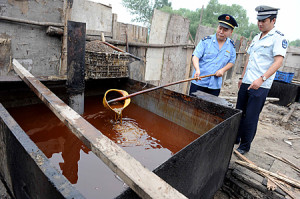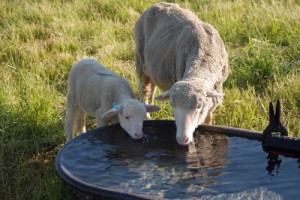Shanghai has stepped up its punishment for those found to be endangering food safety by removing ceilings for fines and allowing the death penalty for severe crimes, a high official from Shanghai’s top court said on Monday.
“The threshold for sending food-safety lawbreakers to prison has been lowered. Stiff penalties both legally and economically will ensure criminals  do not dare to get involved in such crimes again,” said Zou Bihua, vice-president of the Shanghai High People’s Court, at a news conference.
do not dare to get involved in such crimes again,” said Zou Bihua, vice-president of the Shanghai High People’s Court, at a news conference.
China Daily reports the Supreme People’s Court and the Supreme People’s Procuratorate jointly issued a judicial interpretation on May 2, which legal experts said gives clearer definitions of criminal behaviors in the food safety sector.
“For example, the law only defines those who caused serious food poisoning incidents or the like as guilty, but it was hard for courts to determine whether a behavior had caused such incidents or sickness and then declare someone guilty,” said Xu Liming, a presiding judge at the criminal division of the Shanghai High People’s Court.
“The judicial interpretation listed five behaviors that can be defined as causing serious food poisoning or disease. The courts can sentence all those who display such behaviors,” he said.
These behaviors include producing and selling livestock, poultry and aquatic animals that die of diseases or fail inspection and quarantine tests; and producing and selling infant food containing nutrients that do not conform to food safety standards.
A more extensive crackdown on lawbreakers, including people who provide assistance to those who produce or sell poisonous and harmful food, will be implemented.
Anybody who provides funds, loans, invoices, permits — or facilitating conditions such as business sites, transportation, storage, online sales channels and advertising — will be deemed an accomplice, according to the judicial interpretation.










